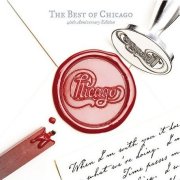 With the temperature dropping, it's time to find someone to keep you warm. Find your hookups with our online dating guide!
With the temperature dropping, it's time to find someone to keep you warm. Find your hookups with our online dating guide!
The Best of Chicago
40th Anniversary Edition
- Rock/Pop
- 2007
- Buy the CD
Reviewed by Mojo Flucke, PhD
()
When Cetera took over as the main frontman, however, it all went downhill. In the band's second act, beginning in the mid-1980s when "Hard to Say I'm Sorry" hit the singles chart, horns were downplayed, synthesizers replaced humans, and Cetera turned the whole enterprise into a vehicle for milquetoast pop compositions like "Love Me Tomorrow," "Hard Habit to Break," and "You're the Inspiration." When Cetera finally left the band, they forgot to turn the lights out – and kept recording! Few people will remember the most recent junk that fills out the second disc of this set. Ironically, Lamm – who fans consider the moral compass of the band and who had reservations about Chicago's "hornless period" – stayed on and played his keyboards while Rome burned. Both Pankow and Lamm openly lament this period in liner-note interviews here, perfectly summed up with Pankow's commentary for "You're the Inspiration": "Sometimes, compromise is a drag."
The saddest marker of the band's recent output on this greatest-hits package is the track "Feel (w/Horns)," With horns? Oh my gosh. That's what made the band incredibly distinctive and popular in the first place. As in, the horns made the band – and yet they didn't bother calling the early hits "25 or 6 to 4 (w/Horns)" or "Does Anybody Really Know What Time It Is? (w/Horns)." That's like listing a B.B. King song as "Paying the Cost to be the Boss (w/Guitar)." Give Rhino credit for putting a good wrapper and excellent liner notes in this package. Ultimately, the music itself is a detailed documentary of a good band's downfall. One hit consistently left off all Chicago greatest-hits sets, "Thunder and Lightning," is left off here, too. Certainly one of the last seven of the 30 tracks on this set could have been left off in favor of that cut, one of the best hits of the late disco/post-disco era. You have Mojo's permission to buy the set and use Disc Two as an attractive drink coaster for your Chicago listening party.
You can follow us on Twitter and Facebook for content updates. Also, sign up for our email list for weekly updates and check us out on Google+ as well.











